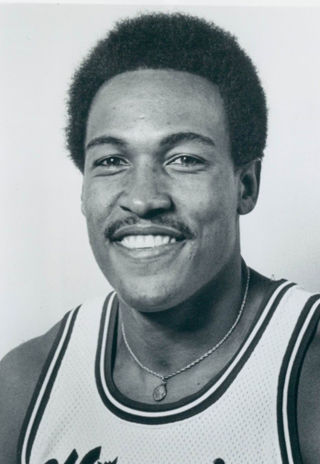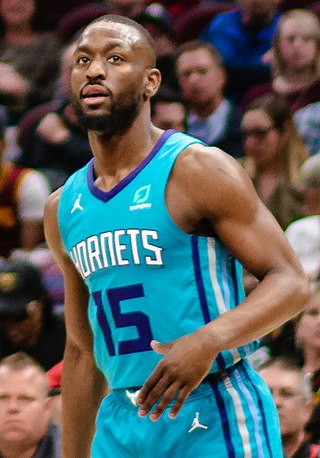
The Kentucky Colonels were a member of the American Basketball Association (ABA) for all of the league's nine years. The name is derived from the historic Kentucky Colonels. The Colonels won the most games and had the highest winning percentage of any franchise in the league's history, but the team did not join the National Basketball Association (NBA) in the 1976 ABA–NBA merger. The downtown Louisville Convention Center was the Colonels' venue for their first three seasons before moving to Freedom Hall for the remaining seasons, beginning with the 1970–71 schedule.

Tayshaun Durell Prince is an American professional basketball executive and former player. The 6-foot-9-inch (2.06 m) small forward graduated from Dominguez High School before playing college basketball for the University of Kentucky. He was drafted 23rd overall by the Detroit Pistons in the 2002 NBA draft and went on to win a championship with the team in 2004.

Robert Allen McAdoo Jr. is an American former professional basketball player and coach. He played 14 seasons in the National Basketball Association (NBA), where he was a five-time NBA All-Star and named the NBA Most Valuable Player (MVP) in 1975. He won two NBA championships with the Los Angeles Lakers during their Showtime era in the 1980s. In 2000, McAdoo was inducted into the Naismith Basketball Hall of Fame. He was named to the NBA 75th Anniversary Team in 2021.

David William Cowens is an American former professional basketball player and NBA head coach. At 6 ft 9 in (2.06 m), he played the center position and occasionally played power forward. Cowens spent most of his playing career with the Boston Celtics. He was the 1971 NBA Rookie of the Year and the 1973 NBA Most Valuable Player. Cowens won NBA championships as a member of the Celtics in 1974 and 1976. He was inducted into the Naismith Memorial Basketball Hall of Fame in 1991. Cowens has also held coaching positions in the NBA, CBA, and WNBA.

Paul Theron Silas was an American professional basketball player and head coach in the National Basketball Association (NBA). As a player, he was a two-time NBA All-Star and earned five selections to the NBA All-Defensive Team, including twice on the first team. He won three NBA championships: two with the Boston Celtics and one with the Seattle SuperSonics. Silas is the leader in most rebounds per game with 12.1 in Suns franchise history.

Caldwell "Pops" Jones Jr. was an American professional basketball player.

Theophalus Curtis Ratliff is an American former professional basketball player who played 16 seasons in the National Basketball Association (NBA).

Steven Charles Mix, nicknamed "The Mayor", is an American former professional basketball player and coach. Mix had a thirteen year playing career, was an NBA All-Star and played in the NBA Finals on four occasions. He later had a lengthy career as a broadcaster for the Philadelphia 76ers.
Christopher Joseph Ford was an American professional basketball player and head coach in the National Basketball Association (NBA). Nicknamed "The Mad Bomber", Ford played most of his NBA career on the Detroit Pistons, before finishing his playing career at the Boston Celtics. In the Celtics' season opener in 1979–80, he was credited with making the first official three-point shot in NBA history. He won an NBA championship with the Celtics in 1981.

Ronald Bruce Boone is an American former professional basketball player. He had a 13-year career in the American Basketball Association (ABA) and National Basketball Association (NBA). Boone set a record for most consecutive games played in professional basketball history with 1,041 and claims to have never missed a game from when he started playing basketball in the fourth grade until his retirement. Boone is the current color commentator on Utah Jazz broadcasts.
The 1984–85 NBA season was the 39th season of the National Basketball Association. The season ended with the Los Angeles Lakers winning the NBA Championship, beating the Boston Celtics 4 games to 2 in the NBA Finals. This was David Stern's first full season as commissioner.
The 1973–74 NBA season was the 28th season of the National Basketball Association. The season ended with the Boston Celtics winning the NBA Championship, beating the Milwaukee Bucks 4 games to 3 in the NBA Finals.
The 1967–68 NBA season was the 22nd season of the National Basketball Association. The season ended with the Boston Celtics winning the NBA Championship, beating the Los Angeles Lakers 4 games to 2 in the NBA Finals.

The 2002 NBA playoffs were the postseason tournament of the National Basketball Association's 2001–02 season. This was the final postseason that held a best-of-5 first-round series; the 2003 NBA playoffs saw those series expand to a best-of-7 format. The tournament concluded with the Western Conference champion Los Angeles Lakers defeating the Eastern Conference champion New Jersey Nets 4 games to 0 in the 2002 NBA Finals. Shaquille O'Neal was named NBA Finals MVP for the third straight year.

Marvin Jerome "Bad News" Barnes was an American professional basketball player. A forward, he was an All-American at Providence College, and played professionally in both the American Basketball Association (ABA) and National Basketball Association (NBA).
The 1999–00 NBA season was the 54th season for the Boston Celtics in the National Basketball Association. During the off-season, the Celtics acquired Danny Fortson, and former Celtics forward Eric Williams from the Denver Nuggets, and signed free agents Calbert Cheaney, and undrafted rookie guard Adrian Griffin. In their third season under head coach Rick Pitino, the Celtics won their first three games, but played below .500 for the first few months, holding a 21–28 record at the All-Star break. At midseason, the team traded Fortson to the Toronto Raptors in exchange for Alvin Williams, but the trade was voided due to Williams failing his physical exam; Fortson only played 55 games this season due to a stress fracture in his right foot. The Celtics struggled and suffered a ten-game losing streak between March and April, but managed to win five of their final six games, finishing fifth in the Atlantic Division with a 35–47 record, and missing the playoffs again for the fifth straight season.
The 1996–97 NBA season was the 51st season for the Boston Celtics in the National Basketball Association. Celebrating its 50th anniversary as one of the NBA's original franchises, the Celtics selected Antoine Walker from the University of Kentucky with the sixth overall pick in the 1996 NBA draft. During the off-season, the team signed free agents Frank Brickowski and Marty Conlon. However, after a 4–8 start to the season, the Celtics lost 13 of their next 14 games as players like Dino Radja, Dana Barros, Dee Brown, Greg Minor and Pervis Ellison were all out for long stretches of the season with injuries. The team suffered through their worst season, holding an 11–35 record at the All-Star break, then posting a 13-game losing streak between February and March, and losing ten straight games near the end of the season. The Celtics lost 34 of their final 38 games, finishing last place in the Atlantic Division with a dreadful 15–67 record, which is the team's worst record in franchise history.

Kemba Hudley Walker is an American professional basketball coach and former player who is a player enhancement coach for the Charlotte Hornets of the National Basketball Association (NBA). He was picked ninth overall by the Charlotte Bobcats in the 2011 NBA draft. He played college basketball for the Connecticut Huskies. In their 2010–11 season, Walker was the nation's second-leading scorer and was named consensus first-team All-American; he also led the Huskies to the 2011 NCAA championship and claimed the tournament's Most Outstanding Player award. Walker is a four-time NBA All-Star.
The 1975–76 American Basketball Association season saw the Spirits of St. Louis, led by Marvin Barnes, Moses Malone, Ron Boone and Caldwell Jones, drop to sixth place in the ABA, with a record of 35–49. As a result, the Spirits missed the playoffs in their second and final season.

The 1975–76 Phoenix Suns season was the eighth season for the Phoenix Suns of the National Basketball Association. The season included an improbable run to the NBA Finals by a team that had never won a playoff series and made the playoffs only one other season in the franchise's existence.












